HI6026 Group Assignment: Auditors and Legal Liability Analysis
VerifiedAdded on 2022/11/24
|9
|3506
|483
Report
AI Summary
This report examines the legal liability of auditors, focusing on the case of Livent v. Deloitte & Touche LLP. It delves into the key events leading to the case, including the restatement of Livent's financial statements and the subsequent drop in share value. The report analyzes the culpability of both parties, highlighting Deloitte's failures in adhering to audit standards and its inadequate professional skepticism. It details the penalties and damages imposed on the audit firm, emphasizing the financial and reputational consequences. The report also explores pertinent accounting and auditing issues raised in the case, such as modifications to Livent's accounting software, amortization practices, and revenue recognition. Furthermore, the report identifies the root causes of the legal suit and offers recommendations for improving audit programs and strategies to prevent similar legal issues in the future, focusing on enhancing professional skepticism and due diligence. The assignment is a group report for the Holmes Institute course HI6026, Audit, Assurance and Compliance.
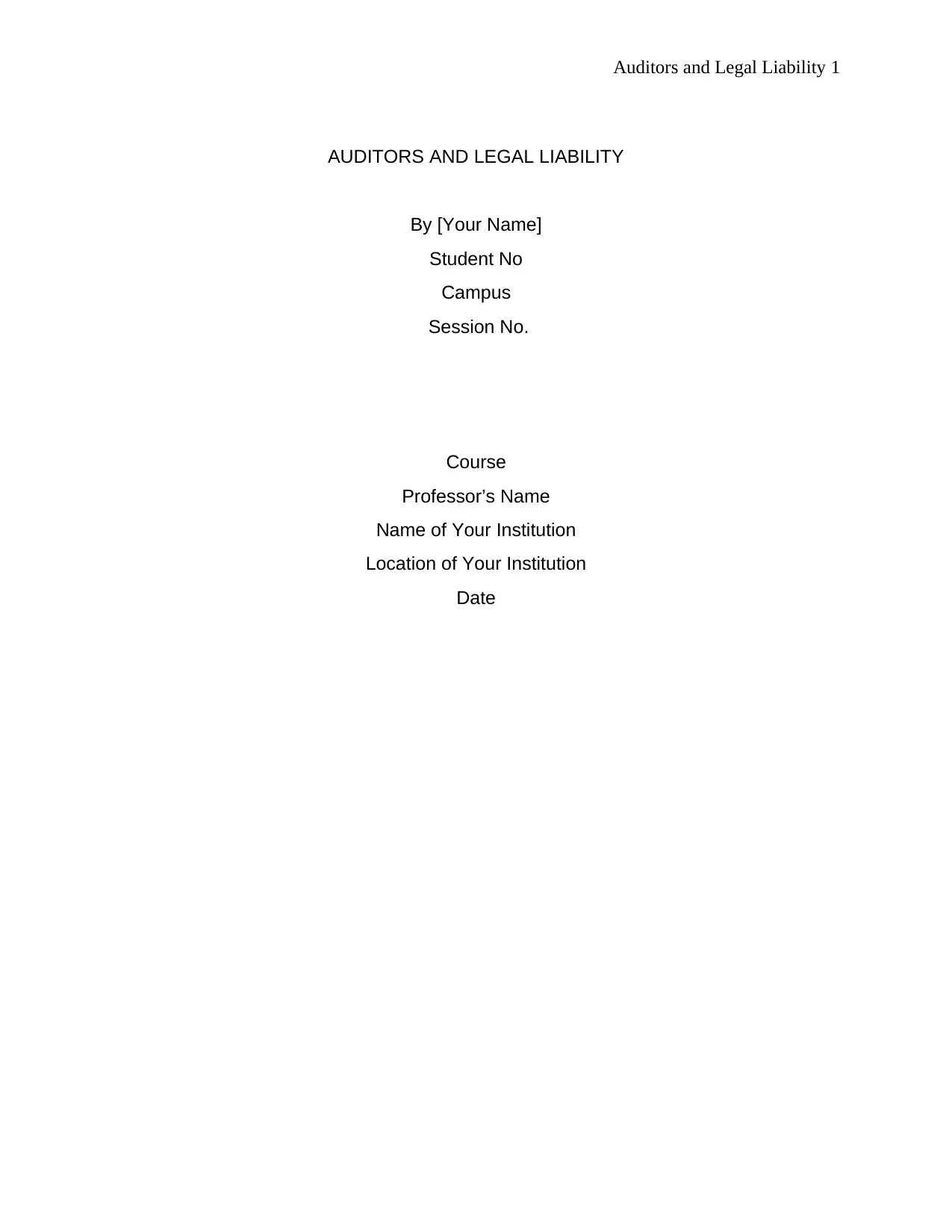
Auditors and Legal Liability 1
AUDITORS AND LEGAL LIABILITY
By [Your Name]
Student No
Campus
Session No.
Course
Professor’s Name
Name of Your Institution
Location of Your Institution
Date
AUDITORS AND LEGAL LIABILITY
By [Your Name]
Student No
Campus
Session No.
Course
Professor’s Name
Name of Your Institution
Location of Your Institution
Date
Paraphrase This Document
Need a fresh take? Get an instant paraphrase of this document with our AI Paraphraser
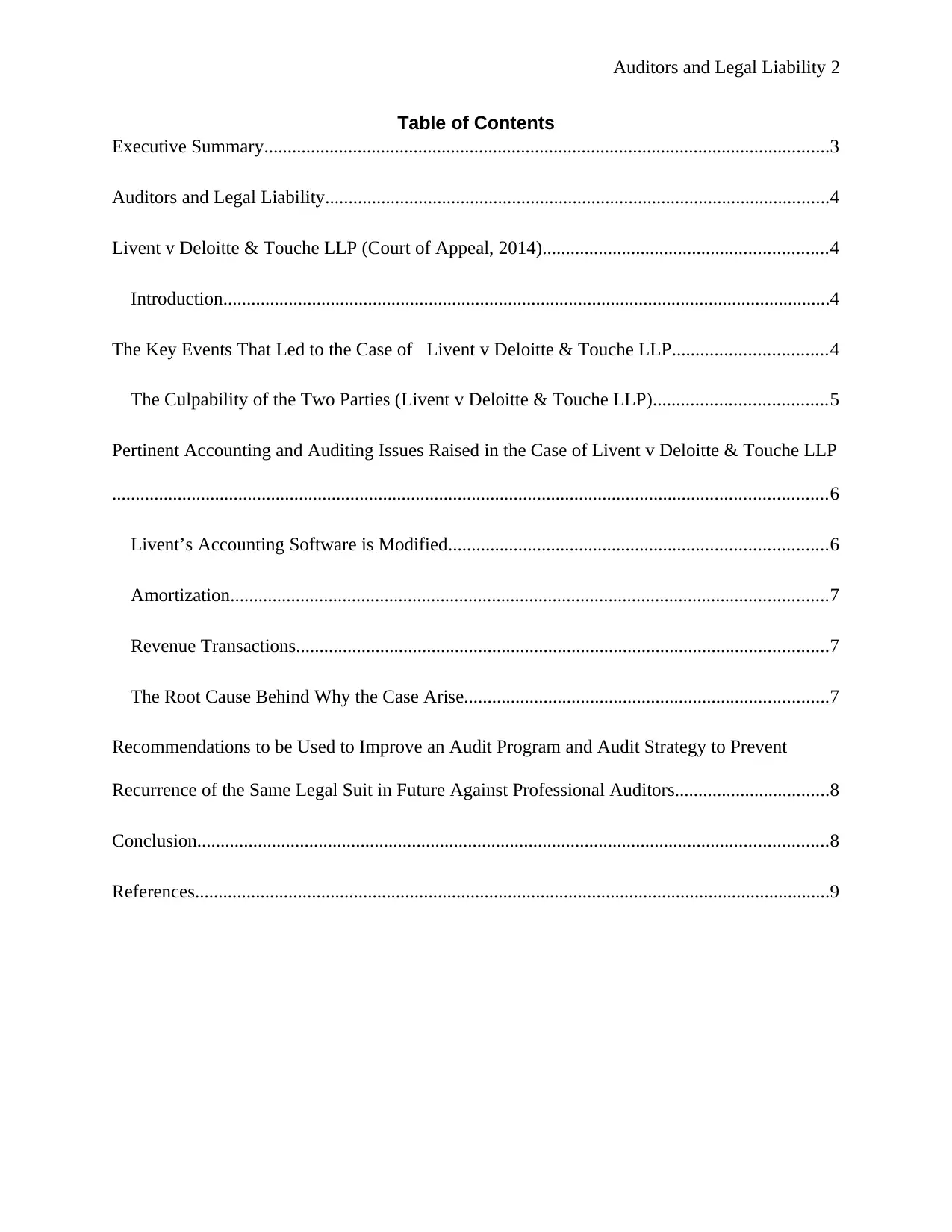
Auditors and Legal Liability 2
Table of Contents
Executive Summary.........................................................................................................................3
Auditors and Legal Liability............................................................................................................4
Livent v Deloitte & Touche LLP (Court of Appeal, 2014).............................................................4
Introduction..................................................................................................................................4
The Key Events That Led to the Case of Livent v Deloitte & Touche LLP.................................4
The Culpability of the Two Parties (Livent v Deloitte & Touche LLP).....................................5
Pertinent Accounting and Auditing Issues Raised in the Case of Livent v Deloitte & Touche LLP
.........................................................................................................................................................6
Livent’s Accounting Software is Modified.................................................................................6
Amortization................................................................................................................................7
Revenue Transactions..................................................................................................................7
The Root Cause Behind Why the Case Arise..............................................................................7
Recommendations to be Used to Improve an Audit Program and Audit Strategy to Prevent
Recurrence of the Same Legal Suit in Future Against Professional Auditors.................................8
Conclusion.......................................................................................................................................8
References........................................................................................................................................9
Table of Contents
Executive Summary.........................................................................................................................3
Auditors and Legal Liability............................................................................................................4
Livent v Deloitte & Touche LLP (Court of Appeal, 2014).............................................................4
Introduction..................................................................................................................................4
The Key Events That Led to the Case of Livent v Deloitte & Touche LLP.................................4
The Culpability of the Two Parties (Livent v Deloitte & Touche LLP).....................................5
Pertinent Accounting and Auditing Issues Raised in the Case of Livent v Deloitte & Touche LLP
.........................................................................................................................................................6
Livent’s Accounting Software is Modified.................................................................................6
Amortization................................................................................................................................7
Revenue Transactions..................................................................................................................7
The Root Cause Behind Why the Case Arise..............................................................................7
Recommendations to be Used to Improve an Audit Program and Audit Strategy to Prevent
Recurrence of the Same Legal Suit in Future Against Professional Auditors.................................8
Conclusion.......................................................................................................................................8
References........................................................................................................................................9
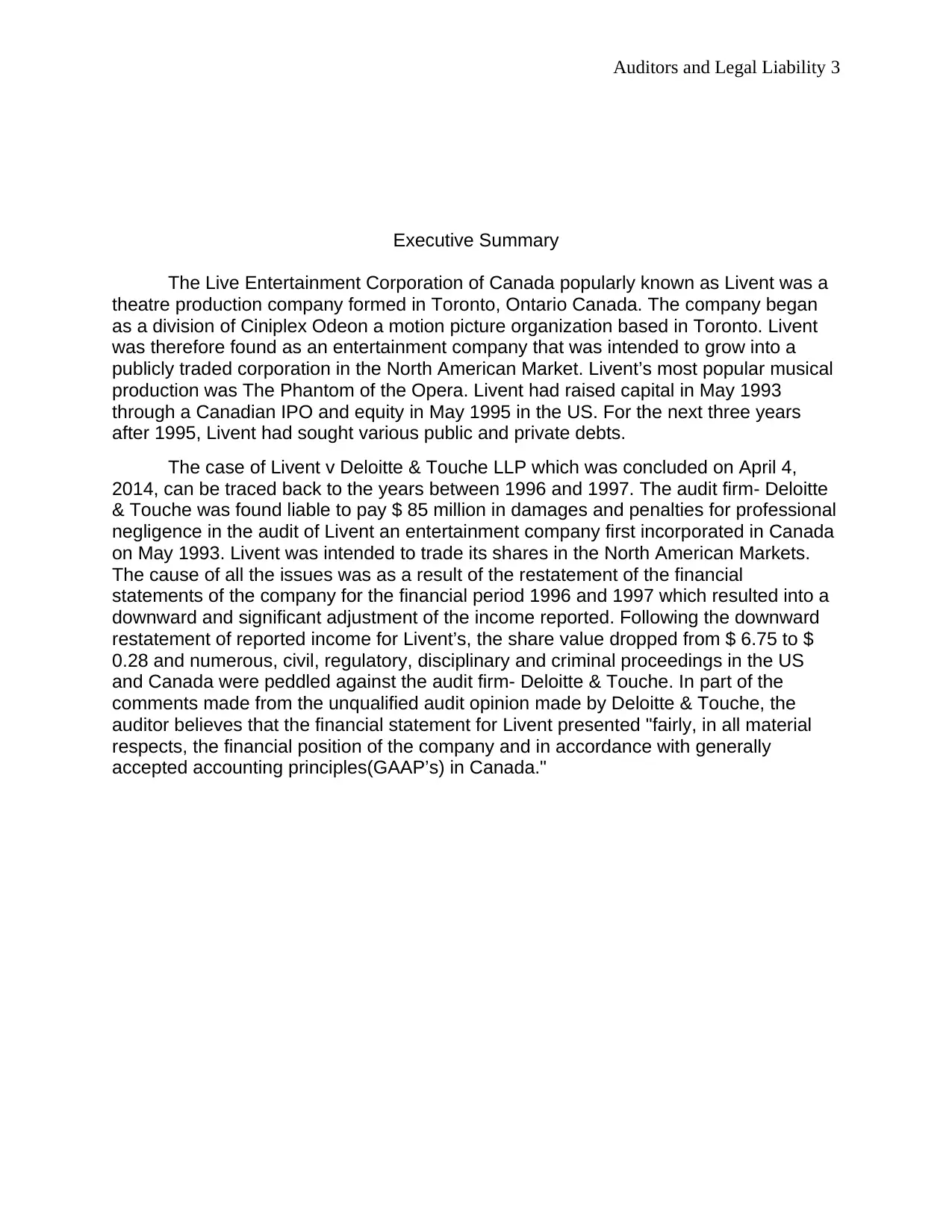
Auditors and Legal Liability 3
Executive Summary
The Live Entertainment Corporation of Canada popularly known as Livent was a
theatre production company formed in Toronto, Ontario Canada. The company began
as a division of Ciniplex Odeon a motion picture organization based in Toronto. Livent
was therefore found as an entertainment company that was intended to grow into a
publicly traded corporation in the North American Market. Livent’s most popular musical
production was The Phantom of the Opera. Livent had raised capital in May 1993
through a Canadian IPO and equity in May 1995 in the US. For the next three years
after 1995, Livent had sought various public and private debts.
The case of Livent v Deloitte & Touche LLP which was concluded on April 4,
2014, can be traced back to the years between 1996 and 1997. The audit firm- Deloitte
& Touche was found liable to pay $ 85 million in damages and penalties for professional
negligence in the audit of Livent an entertainment company first incorporated in Canada
on May 1993. Livent was intended to trade its shares in the North American Markets.
The cause of all the issues was as a result of the restatement of the financial
statements of the company for the financial period 1996 and 1997 which resulted into a
downward and significant adjustment of the income reported. Following the downward
restatement of reported income for Livent’s, the share value dropped from $ 6.75 to $
0.28 and numerous, civil, regulatory, disciplinary and criminal proceedings in the US
and Canada were peddled against the audit firm- Deloitte & Touche. In part of the
comments made from the unqualified audit opinion made by Deloitte & Touche, the
auditor believes that the financial statement for Livent presented "fairly, in all material
respects, the financial position of the company and in accordance with generally
accepted accounting principles(GAAP’s) in Canada."
Executive Summary
The Live Entertainment Corporation of Canada popularly known as Livent was a
theatre production company formed in Toronto, Ontario Canada. The company began
as a division of Ciniplex Odeon a motion picture organization based in Toronto. Livent
was therefore found as an entertainment company that was intended to grow into a
publicly traded corporation in the North American Market. Livent’s most popular musical
production was The Phantom of the Opera. Livent had raised capital in May 1993
through a Canadian IPO and equity in May 1995 in the US. For the next three years
after 1995, Livent had sought various public and private debts.
The case of Livent v Deloitte & Touche LLP which was concluded on April 4,
2014, can be traced back to the years between 1996 and 1997. The audit firm- Deloitte
& Touche was found liable to pay $ 85 million in damages and penalties for professional
negligence in the audit of Livent an entertainment company first incorporated in Canada
on May 1993. Livent was intended to trade its shares in the North American Markets.
The cause of all the issues was as a result of the restatement of the financial
statements of the company for the financial period 1996 and 1997 which resulted into a
downward and significant adjustment of the income reported. Following the downward
restatement of reported income for Livent’s, the share value dropped from $ 6.75 to $
0.28 and numerous, civil, regulatory, disciplinary and criminal proceedings in the US
and Canada were peddled against the audit firm- Deloitte & Touche. In part of the
comments made from the unqualified audit opinion made by Deloitte & Touche, the
auditor believes that the financial statement for Livent presented "fairly, in all material
respects, the financial position of the company and in accordance with generally
accepted accounting principles(GAAP’s) in Canada."
⊘ This is a preview!⊘
Do you want full access?
Subscribe today to unlock all pages.

Trusted by 1+ million students worldwide
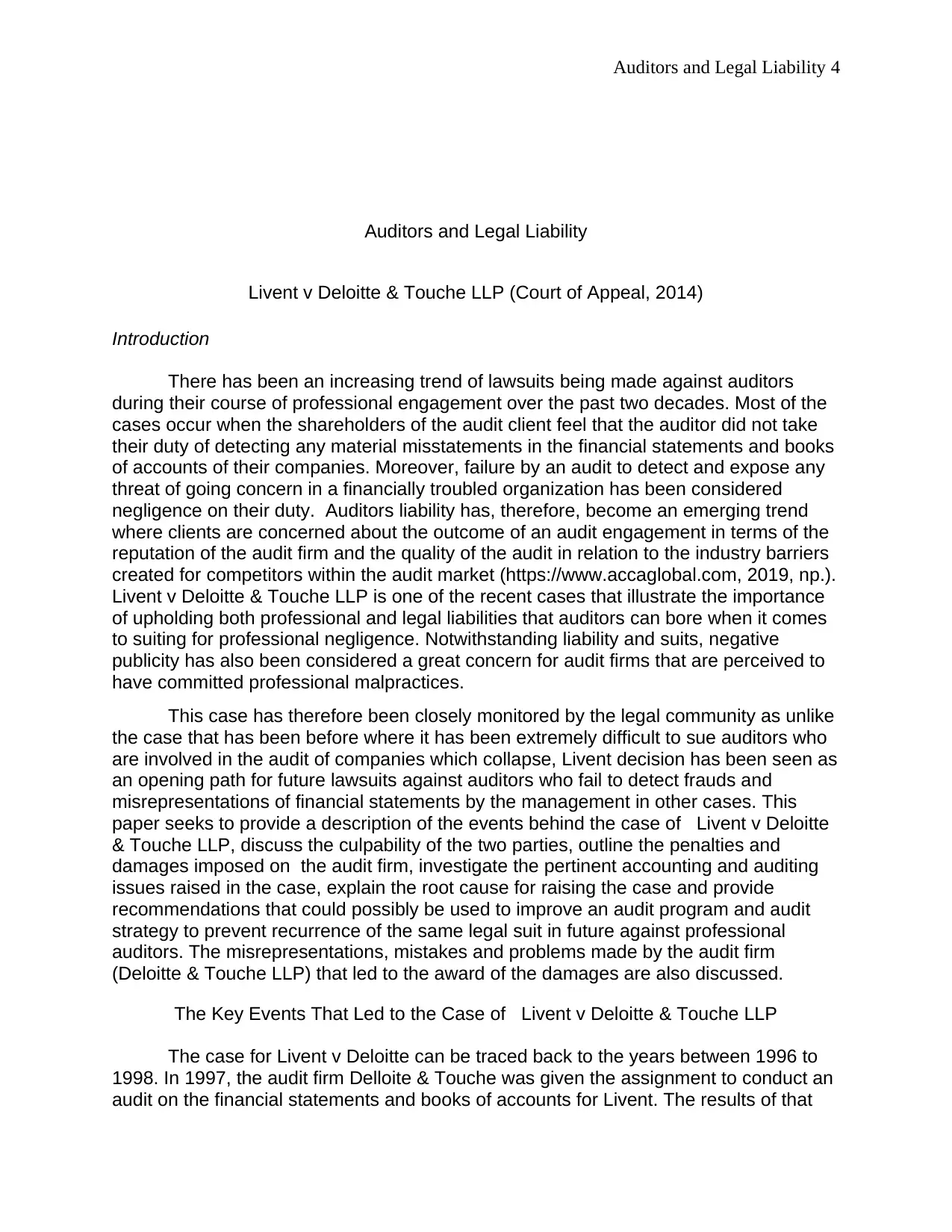
Auditors and Legal Liability 4
Auditors and Legal Liability
Livent v Deloitte & Touche LLP (Court of Appeal, 2014)
Introduction
There has been an increasing trend of lawsuits being made against auditors
during their course of professional engagement over the past two decades. Most of the
cases occur when the shareholders of the audit client feel that the auditor did not take
their duty of detecting any material misstatements in the financial statements and books
of accounts of their companies. Moreover, failure by an audit to detect and expose any
threat of going concern in a financially troubled organization has been considered
negligence on their duty. Auditors liability has, therefore, become an emerging trend
where clients are concerned about the outcome of an audit engagement in terms of the
reputation of the audit firm and the quality of the audit in relation to the industry barriers
created for competitors within the audit market (https://www.accaglobal.com, 2019, np.).
Livent v Deloitte & Touche LLP is one of the recent cases that illustrate the importance
of upholding both professional and legal liabilities that auditors can bore when it comes
to suiting for professional negligence. Notwithstanding liability and suits, negative
publicity has also been considered a great concern for audit firms that are perceived to
have committed professional malpractices.
This case has therefore been closely monitored by the legal community as unlike
the case that has been before where it has been extremely difficult to sue auditors who
are involved in the audit of companies which collapse, Livent decision has been seen as
an opening path for future lawsuits against auditors who fail to detect frauds and
misrepresentations of financial statements by the management in other cases. This
paper seeks to provide a description of the events behind the case of Livent v Deloitte
& Touche LLP, discuss the culpability of the two parties, outline the penalties and
damages imposed on the audit firm, investigate the pertinent accounting and auditing
issues raised in the case, explain the root cause for raising the case and provide
recommendations that could possibly be used to improve an audit program and audit
strategy to prevent recurrence of the same legal suit in future against professional
auditors. The misrepresentations, mistakes and problems made by the audit firm
(Deloitte & Touche LLP) that led to the award of the damages are also discussed.
The Key Events That Led to the Case of Livent v Deloitte & Touche LLP
The case for Livent v Deloitte can be traced back to the years between 1996 to
1998. In 1997, the audit firm Delloite & Touche was given the assignment to conduct an
audit on the financial statements and books of accounts for Livent. The results of that
Auditors and Legal Liability
Livent v Deloitte & Touche LLP (Court of Appeal, 2014)
Introduction
There has been an increasing trend of lawsuits being made against auditors
during their course of professional engagement over the past two decades. Most of the
cases occur when the shareholders of the audit client feel that the auditor did not take
their duty of detecting any material misstatements in the financial statements and books
of accounts of their companies. Moreover, failure by an audit to detect and expose any
threat of going concern in a financially troubled organization has been considered
negligence on their duty. Auditors liability has, therefore, become an emerging trend
where clients are concerned about the outcome of an audit engagement in terms of the
reputation of the audit firm and the quality of the audit in relation to the industry barriers
created for competitors within the audit market (https://www.accaglobal.com, 2019, np.).
Livent v Deloitte & Touche LLP is one of the recent cases that illustrate the importance
of upholding both professional and legal liabilities that auditors can bore when it comes
to suiting for professional negligence. Notwithstanding liability and suits, negative
publicity has also been considered a great concern for audit firms that are perceived to
have committed professional malpractices.
This case has therefore been closely monitored by the legal community as unlike
the case that has been before where it has been extremely difficult to sue auditors who
are involved in the audit of companies which collapse, Livent decision has been seen as
an opening path for future lawsuits against auditors who fail to detect frauds and
misrepresentations of financial statements by the management in other cases. This
paper seeks to provide a description of the events behind the case of Livent v Deloitte
& Touche LLP, discuss the culpability of the two parties, outline the penalties and
damages imposed on the audit firm, investigate the pertinent accounting and auditing
issues raised in the case, explain the root cause for raising the case and provide
recommendations that could possibly be used to improve an audit program and audit
strategy to prevent recurrence of the same legal suit in future against professional
auditors. The misrepresentations, mistakes and problems made by the audit firm
(Deloitte & Touche LLP) that led to the award of the damages are also discussed.
The Key Events That Led to the Case of Livent v Deloitte & Touche LLP
The case for Livent v Deloitte can be traced back to the years between 1996 to
1998. In 1997, the audit firm Delloite & Touche was given the assignment to conduct an
audit on the financial statements and books of accounts for Livent. The results of that
Paraphrase This Document
Need a fresh take? Get an instant paraphrase of this document with our AI Paraphraser
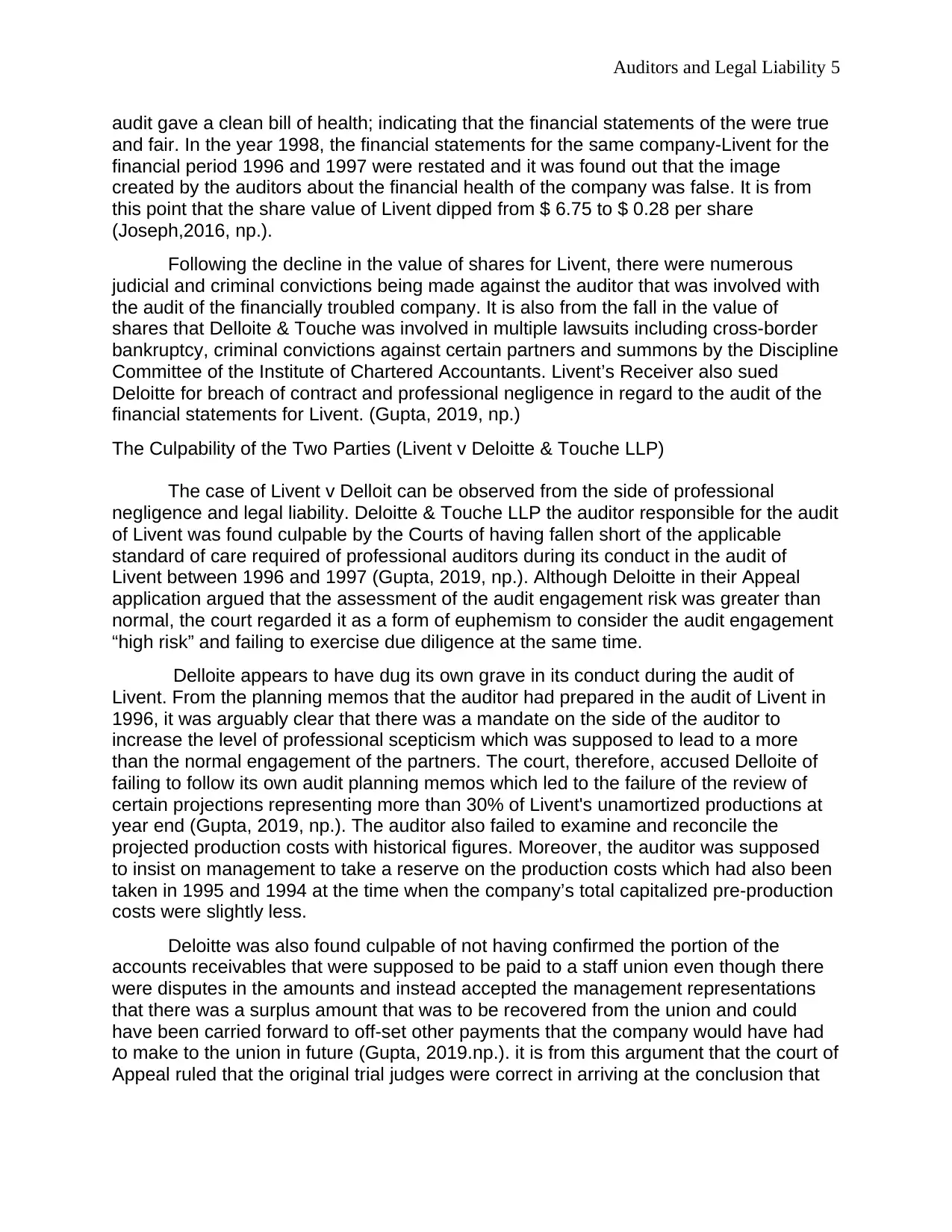
Auditors and Legal Liability 5
audit gave a clean bill of health; indicating that the financial statements of the were true
and fair. In the year 1998, the financial statements for the same company-Livent for the
financial period 1996 and 1997 were restated and it was found out that the image
created by the auditors about the financial health of the company was false. It is from
this point that the share value of Livent dipped from $ 6.75 to $ 0.28 per share
(Joseph,2016, np.).
Following the decline in the value of shares for Livent, there were numerous
judicial and criminal convictions being made against the auditor that was involved with
the audit of the financially troubled company. It is also from the fall in the value of
shares that Delloite & Touche was involved in multiple lawsuits including cross-border
bankruptcy, criminal convictions against certain partners and summons by the Discipline
Committee of the Institute of Chartered Accountants. Livent’s Receiver also sued
Deloitte for breach of contract and professional negligence in regard to the audit of the
financial statements for Livent. (Gupta, 2019, np.)
The Culpability of the Two Parties (Livent v Deloitte & Touche LLP)
The case of Livent v Delloit can be observed from the side of professional
negligence and legal liability. Deloitte & Touche LLP the auditor responsible for the audit
of Livent was found culpable by the Courts of having fallen short of the applicable
standard of care required of professional auditors during its conduct in the audit of
Livent between 1996 and 1997 (Gupta, 2019, np.). Although Deloitte in their Appeal
application argued that the assessment of the audit engagement risk was greater than
normal, the court regarded it as a form of euphemism to consider the audit engagement
“high risk” and failing to exercise due diligence at the same time.
Delloite appears to have dug its own grave in its conduct during the audit of
Livent. From the planning memos that the auditor had prepared in the audit of Livent in
1996, it was arguably clear that there was a mandate on the side of the auditor to
increase the level of professional scepticism which was supposed to lead to a more
than the normal engagement of the partners. The court, therefore, accused Delloite of
failing to follow its own audit planning memos which led to the failure of the review of
certain projections representing more than 30% of Livent's unamortized productions at
year end (Gupta, 2019, np.). The auditor also failed to examine and reconcile the
projected production costs with historical figures. Moreover, the auditor was supposed
to insist on management to take a reserve on the production costs which had also been
taken in 1995 and 1994 at the time when the company’s total capitalized pre-production
costs were slightly less.
Deloitte was also found culpable of not having confirmed the portion of the
accounts receivables that were supposed to be paid to a staff union even though there
were disputes in the amounts and instead accepted the management representations
that there was a surplus amount that was to be recovered from the union and could
have been carried forward to off-set other payments that the company would have had
to make to the union in future (Gupta, 2019.np.). it is from this argument that the court of
Appeal ruled that the original trial judges were correct in arriving at the conclusion that
audit gave a clean bill of health; indicating that the financial statements of the were true
and fair. In the year 1998, the financial statements for the same company-Livent for the
financial period 1996 and 1997 were restated and it was found out that the image
created by the auditors about the financial health of the company was false. It is from
this point that the share value of Livent dipped from $ 6.75 to $ 0.28 per share
(Joseph,2016, np.).
Following the decline in the value of shares for Livent, there were numerous
judicial and criminal convictions being made against the auditor that was involved with
the audit of the financially troubled company. It is also from the fall in the value of
shares that Delloite & Touche was involved in multiple lawsuits including cross-border
bankruptcy, criminal convictions against certain partners and summons by the Discipline
Committee of the Institute of Chartered Accountants. Livent’s Receiver also sued
Deloitte for breach of contract and professional negligence in regard to the audit of the
financial statements for Livent. (Gupta, 2019, np.)
The Culpability of the Two Parties (Livent v Deloitte & Touche LLP)
The case of Livent v Delloit can be observed from the side of professional
negligence and legal liability. Deloitte & Touche LLP the auditor responsible for the audit
of Livent was found culpable by the Courts of having fallen short of the applicable
standard of care required of professional auditors during its conduct in the audit of
Livent between 1996 and 1997 (Gupta, 2019, np.). Although Deloitte in their Appeal
application argued that the assessment of the audit engagement risk was greater than
normal, the court regarded it as a form of euphemism to consider the audit engagement
“high risk” and failing to exercise due diligence at the same time.
Delloite appears to have dug its own grave in its conduct during the audit of
Livent. From the planning memos that the auditor had prepared in the audit of Livent in
1996, it was arguably clear that there was a mandate on the side of the auditor to
increase the level of professional scepticism which was supposed to lead to a more
than the normal engagement of the partners. The court, therefore, accused Delloite of
failing to follow its own audit planning memos which led to the failure of the review of
certain projections representing more than 30% of Livent's unamortized productions at
year end (Gupta, 2019, np.). The auditor also failed to examine and reconcile the
projected production costs with historical figures. Moreover, the auditor was supposed
to insist on management to take a reserve on the production costs which had also been
taken in 1995 and 1994 at the time when the company’s total capitalized pre-production
costs were slightly less.
Deloitte was also found culpable of not having confirmed the portion of the
accounts receivables that were supposed to be paid to a staff union even though there
were disputes in the amounts and instead accepted the management representations
that there was a surplus amount that was to be recovered from the union and could
have been carried forward to off-set other payments that the company would have had
to make to the union in future (Gupta, 2019.np.). it is from this argument that the court of
Appeal ruled that the original trial judges were correct in arriving at the conclusion that
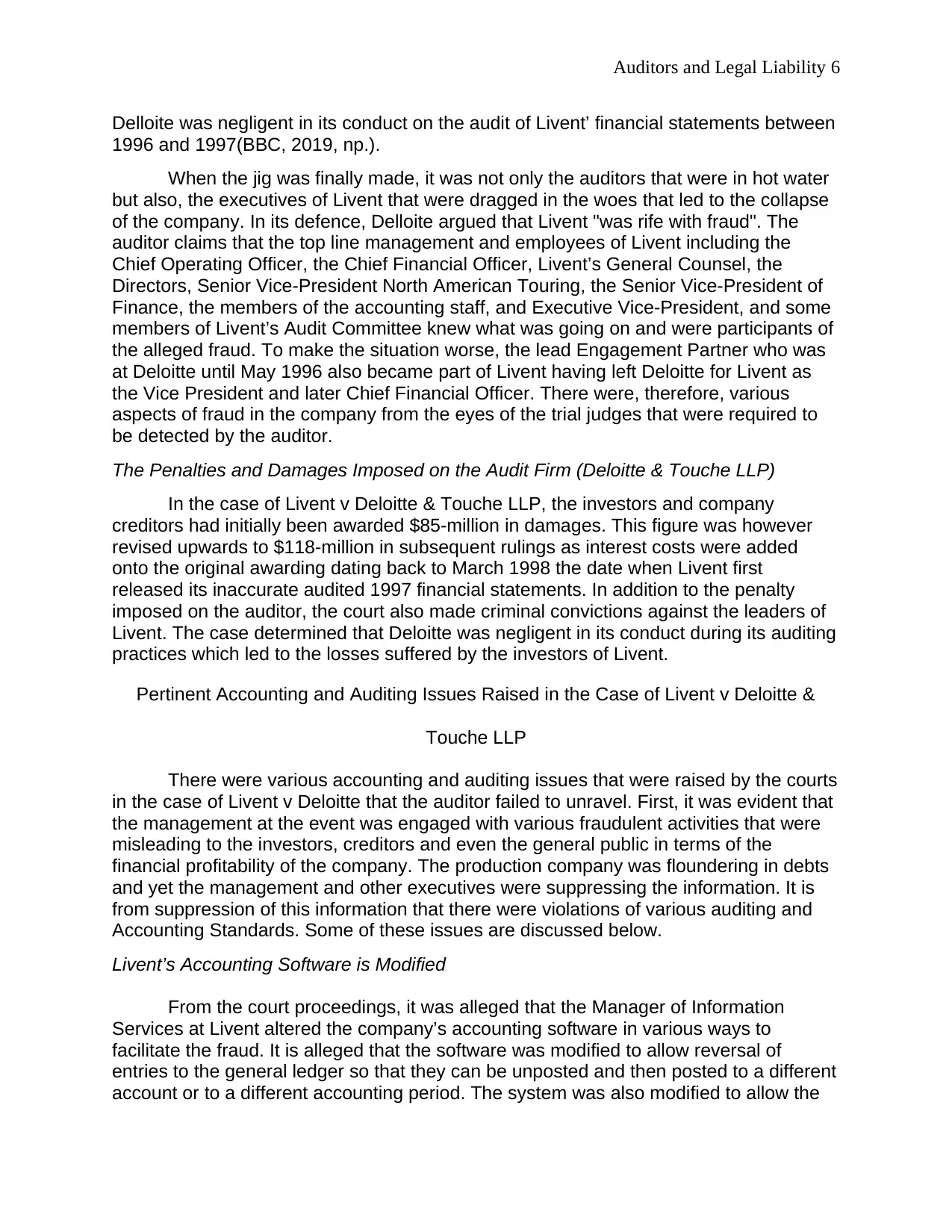
Auditors and Legal Liability 6
Delloite was negligent in its conduct on the audit of Livent’ financial statements between
1996 and 1997(BBC, 2019, np.).
When the jig was finally made, it was not only the auditors that were in hot water
but also, the executives of Livent that were dragged in the woes that led to the collapse
of the company. In its defence, Delloite argued that Livent "was rife with fraud". The
auditor claims that the top line management and employees of Livent including the
Chief Operating Officer, the Chief Financial Officer, Livent’s General Counsel, the
Directors, Senior Vice-President North American Touring, the Senior Vice-President of
Finance, the members of the accounting staff, and Executive Vice-President, and some
members of Livent’s Audit Committee knew what was going on and were participants of
the alleged fraud. To make the situation worse, the lead Engagement Partner who was
at Deloitte until May 1996 also became part of Livent having left Deloitte for Livent as
the Vice President and later Chief Financial Officer. There were, therefore, various
aspects of fraud in the company from the eyes of the trial judges that were required to
be detected by the auditor.
The Penalties and Damages Imposed on the Audit Firm (Deloitte & Touche LLP)
In the case of Livent v Deloitte & Touche LLP, the investors and company
creditors had initially been awarded $85-million in damages. This figure was however
revised upwards to $118-million in subsequent rulings as interest costs were added
onto the original awarding dating back to March 1998 the date when Livent first
released its inaccurate audited 1997 financial statements. In addition to the penalty
imposed on the auditor, the court also made criminal convictions against the leaders of
Livent. The case determined that Deloitte was negligent in its conduct during its auditing
practices which led to the losses suffered by the investors of Livent.
Pertinent Accounting and Auditing Issues Raised in the Case of Livent v Deloitte &
Touche LLP
There were various accounting and auditing issues that were raised by the courts
in the case of Livent v Deloitte that the auditor failed to unravel. First, it was evident that
the management at the event was engaged with various fraudulent activities that were
misleading to the investors, creditors and even the general public in terms of the
financial profitability of the company. The production company was floundering in debts
and yet the management and other executives were suppressing the information. It is
from suppression of this information that there were violations of various auditing and
Accounting Standards. Some of these issues are discussed below.
Livent’s Accounting Software is Modified
From the court proceedings, it was alleged that the Manager of Information
Services at Livent altered the company’s accounting software in various ways to
facilitate the fraud. It is alleged that the software was modified to allow reversal of
entries to the general ledger so that they can be unposted and then posted to a different
account or to a different accounting period. The system was also modified to allow the
Delloite was negligent in its conduct on the audit of Livent’ financial statements between
1996 and 1997(BBC, 2019, np.).
When the jig was finally made, it was not only the auditors that were in hot water
but also, the executives of Livent that were dragged in the woes that led to the collapse
of the company. In its defence, Delloite argued that Livent "was rife with fraud". The
auditor claims that the top line management and employees of Livent including the
Chief Operating Officer, the Chief Financial Officer, Livent’s General Counsel, the
Directors, Senior Vice-President North American Touring, the Senior Vice-President of
Finance, the members of the accounting staff, and Executive Vice-President, and some
members of Livent’s Audit Committee knew what was going on and were participants of
the alleged fraud. To make the situation worse, the lead Engagement Partner who was
at Deloitte until May 1996 also became part of Livent having left Deloitte for Livent as
the Vice President and later Chief Financial Officer. There were, therefore, various
aspects of fraud in the company from the eyes of the trial judges that were required to
be detected by the auditor.
The Penalties and Damages Imposed on the Audit Firm (Deloitte & Touche LLP)
In the case of Livent v Deloitte & Touche LLP, the investors and company
creditors had initially been awarded $85-million in damages. This figure was however
revised upwards to $118-million in subsequent rulings as interest costs were added
onto the original awarding dating back to March 1998 the date when Livent first
released its inaccurate audited 1997 financial statements. In addition to the penalty
imposed on the auditor, the court also made criminal convictions against the leaders of
Livent. The case determined that Deloitte was negligent in its conduct during its auditing
practices which led to the losses suffered by the investors of Livent.
Pertinent Accounting and Auditing Issues Raised in the Case of Livent v Deloitte &
Touche LLP
There were various accounting and auditing issues that were raised by the courts
in the case of Livent v Deloitte that the auditor failed to unravel. First, it was evident that
the management at the event was engaged with various fraudulent activities that were
misleading to the investors, creditors and even the general public in terms of the
financial profitability of the company. The production company was floundering in debts
and yet the management and other executives were suppressing the information. It is
from suppression of this information that there were violations of various auditing and
Accounting Standards. Some of these issues are discussed below.
Livent’s Accounting Software is Modified
From the court proceedings, it was alleged that the Manager of Information
Services at Livent altered the company’s accounting software in various ways to
facilitate the fraud. It is alleged that the software was modified to allow reversal of
entries to the general ledger so that they can be unposted and then posted to a different
account or to a different accounting period. The system was also modified to allow the
⊘ This is a preview!⊘
Do you want full access?
Subscribe today to unlock all pages.

Trusted by 1+ million students worldwide
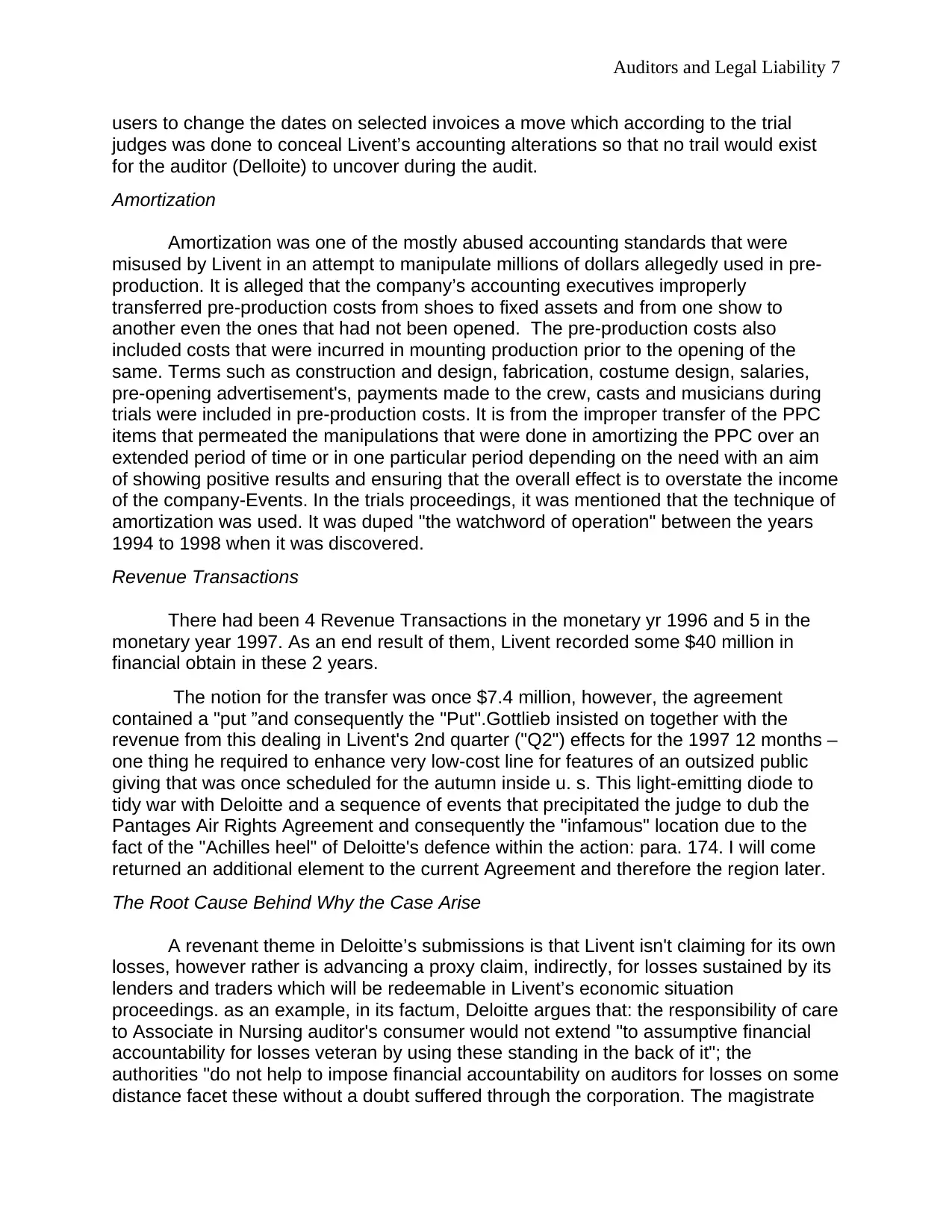
Auditors and Legal Liability 7
users to change the dates on selected invoices a move which according to the trial
judges was done to conceal Livent’s accounting alterations so that no trail would exist
for the auditor (Delloite) to uncover during the audit.
Amortization
Amortization was one of the mostly abused accounting standards that were
misused by Livent in an attempt to manipulate millions of dollars allegedly used in pre-
production. It is alleged that the company’s accounting executives improperly
transferred pre-production costs from shoes to fixed assets and from one show to
another even the ones that had not been opened. The pre-production costs also
included costs that were incurred in mounting production prior to the opening of the
same. Terms such as construction and design, fabrication, costume design, salaries,
pre-opening advertisement's, payments made to the crew, casts and musicians during
trials were included in pre-production costs. It is from the improper transfer of the PPC
items that permeated the manipulations that were done in amortizing the PPC over an
extended period of time or in one particular period depending on the need with an aim
of showing positive results and ensuring that the overall effect is to overstate the income
of the company-Events. In the trials proceedings, it was mentioned that the technique of
amortization was used. It was duped "the watchword of operation" between the years
1994 to 1998 when it was discovered.
Revenue Transactions
There had been 4 Revenue Transactions in the monetary yr 1996 and 5 in the
monetary year 1997. As an end result of them, Livent recorded some $40 million in
financial obtain in these 2 years.
The notion for the transfer was once $7.4 million, however, the agreement
contained a "put ”and consequently the "Put".Gottlieb insisted on together with the
revenue from this dealing in Livent's 2nd quarter ("Q2") effects for the 1997 12 months –
one thing he required to enhance very low-cost line for features of an outsized public
giving that was once scheduled for the autumn inside u. s. This light-emitting diode to
tidy war with Deloitte and a sequence of events that precipitated the judge to dub the
Pantages Air Rights Agreement and consequently the "infamous" location due to the
fact of the "Achilles heel" of Deloitte's defence within the action: para. 174. I will come
returned an additional element to the current Agreement and therefore the region later.
The Root Cause Behind Why the Case Arise
A revenant theme in Deloitte’s submissions is that Livent isn't claiming for its own
losses, however rather is advancing a proxy claim, indirectly, for losses sustained by its
lenders and traders which will be redeemable in Livent’s economic situation
proceedings. as an example, in its factum, Deloitte argues that: the responsibility of care
to Associate in Nursing auditor's consumer would not extend "to assumptive financial
accountability for losses veteran by using these standing in the back of it"; the
authorities "do not help to impose financial accountability on auditors for losses on some
distance facet these without a doubt suffered through the corporation. The magistrate
users to change the dates on selected invoices a move which according to the trial
judges was done to conceal Livent’s accounting alterations so that no trail would exist
for the auditor (Delloite) to uncover during the audit.
Amortization
Amortization was one of the mostly abused accounting standards that were
misused by Livent in an attempt to manipulate millions of dollars allegedly used in pre-
production. It is alleged that the company’s accounting executives improperly
transferred pre-production costs from shoes to fixed assets and from one show to
another even the ones that had not been opened. The pre-production costs also
included costs that were incurred in mounting production prior to the opening of the
same. Terms such as construction and design, fabrication, costume design, salaries,
pre-opening advertisement's, payments made to the crew, casts and musicians during
trials were included in pre-production costs. It is from the improper transfer of the PPC
items that permeated the manipulations that were done in amortizing the PPC over an
extended period of time or in one particular period depending on the need with an aim
of showing positive results and ensuring that the overall effect is to overstate the income
of the company-Events. In the trials proceedings, it was mentioned that the technique of
amortization was used. It was duped "the watchword of operation" between the years
1994 to 1998 when it was discovered.
Revenue Transactions
There had been 4 Revenue Transactions in the monetary yr 1996 and 5 in the
monetary year 1997. As an end result of them, Livent recorded some $40 million in
financial obtain in these 2 years.
The notion for the transfer was once $7.4 million, however, the agreement
contained a "put ”and consequently the "Put".Gottlieb insisted on together with the
revenue from this dealing in Livent's 2nd quarter ("Q2") effects for the 1997 12 months –
one thing he required to enhance very low-cost line for features of an outsized public
giving that was once scheduled for the autumn inside u. s. This light-emitting diode to
tidy war with Deloitte and a sequence of events that precipitated the judge to dub the
Pantages Air Rights Agreement and consequently the "infamous" location due to the
fact of the "Achilles heel" of Deloitte's defence within the action: para. 174. I will come
returned an additional element to the current Agreement and therefore the region later.
The Root Cause Behind Why the Case Arise
A revenant theme in Deloitte’s submissions is that Livent isn't claiming for its own
losses, however rather is advancing a proxy claim, indirectly, for losses sustained by its
lenders and traders which will be redeemable in Livent’s economic situation
proceedings. as an example, in its factum, Deloitte argues that: the responsibility of care
to Associate in Nursing auditor's consumer would not extend "to assumptive financial
accountability for losses veteran by using these standing in the back of it"; the
authorities "do not help to impose financial accountability on auditors for losses on some
distance facet these without a doubt suffered through the corporation. The magistrate
Paraphrase This Document
Need a fresh take? Get an instant paraphrase of this document with our AI Paraphraser
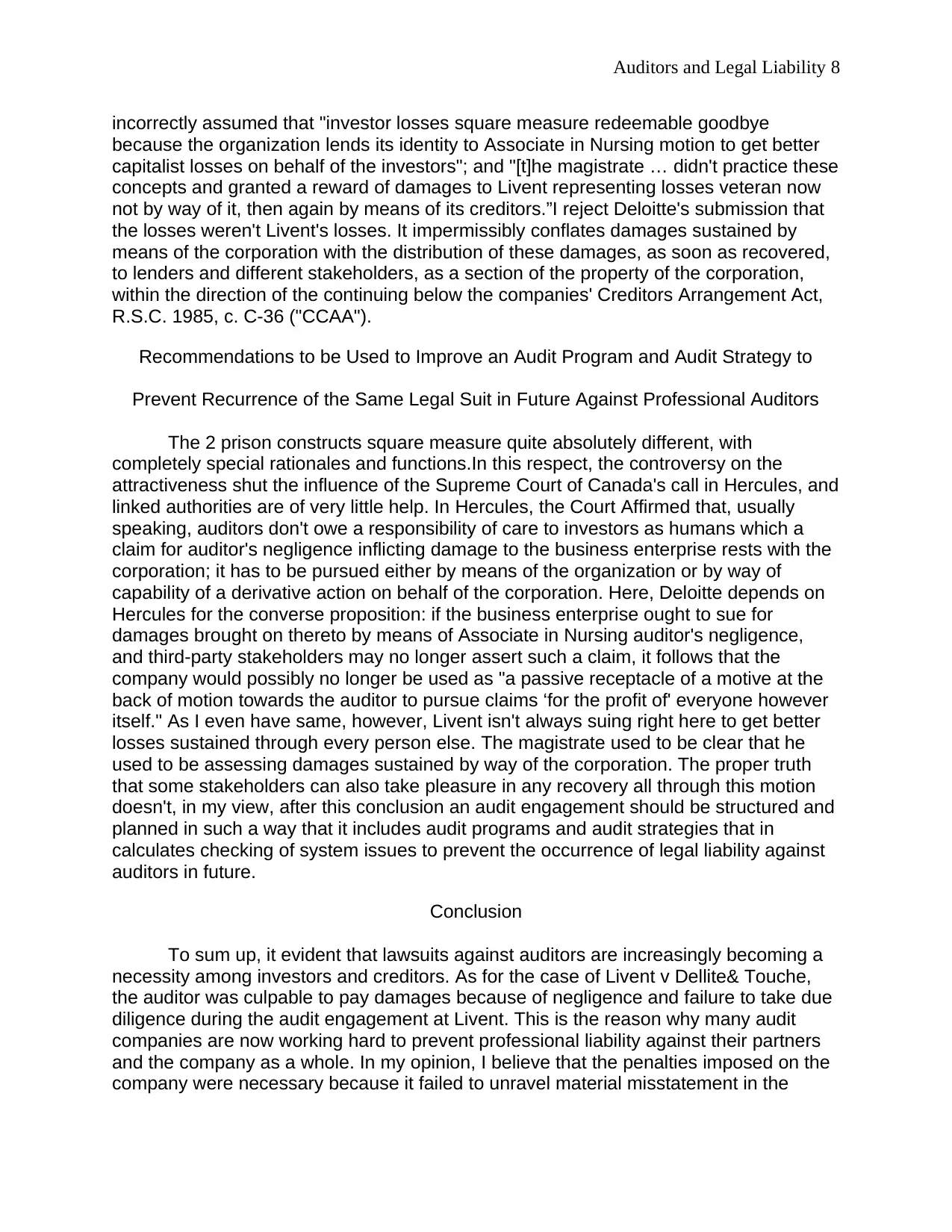
Auditors and Legal Liability 8
incorrectly assumed that "investor losses square measure redeemable goodbye
because the organization lends its identity to Associate in Nursing motion to get better
capitalist losses on behalf of the investors"; and "[t]he magistrate … didn't practice these
concepts and granted a reward of damages to Livent representing losses veteran now
not by way of it, then again by means of its creditors.”I reject Deloitte's submission that
the losses weren't Livent's losses. It impermissibly conflates damages sustained by
means of the corporation with the distribution of these damages, as soon as recovered,
to lenders and different stakeholders, as a section of the property of the corporation,
within the direction of the continuing below the companies' Creditors Arrangement Act,
R.S.C. 1985, c. C-36 ("CCAA").
Recommendations to be Used to Improve an Audit Program and Audit Strategy to
Prevent Recurrence of the Same Legal Suit in Future Against Professional Auditors
The 2 prison constructs square measure quite absolutely different, with
completely special rationales and functions.In this respect, the controversy on the
attractiveness shut the influence of the Supreme Court of Canada's call in Hercules, and
linked authorities are of very little help. In Hercules, the Court Affirmed that, usually
speaking, auditors don't owe a responsibility of care to investors as humans which a
claim for auditor's negligence inflicting damage to the business enterprise rests with the
corporation; it has to be pursued either by means of the organization or by way of
capability of a derivative action on behalf of the corporation. Here, Deloitte depends on
Hercules for the converse proposition: if the business enterprise ought to sue for
damages brought on thereto by means of Associate in Nursing auditor's negligence,
and third-party stakeholders may no longer assert such a claim, it follows that the
company would possibly no longer be used as "a passive receptacle of a motive at the
back of motion towards the auditor to pursue claims ‘for the profit of' everyone however
itself." As I even have same, however, Livent isn't always suing right here to get better
losses sustained through every person else. The magistrate used to be clear that he
used to be assessing damages sustained by way of the corporation. The proper truth
that some stakeholders can also take pleasure in any recovery all through this motion
doesn't, in my view, after this conclusion an audit engagement should be structured and
planned in such a way that it includes audit programs and audit strategies that in
calculates checking of system issues to prevent the occurrence of legal liability against
auditors in future.
Conclusion
To sum up, it evident that lawsuits against auditors are increasingly becoming a
necessity among investors and creditors. As for the case of Livent v Dellite& Touche,
the auditor was culpable to pay damages because of negligence and failure to take due
diligence during the audit engagement at Livent. This is the reason why many audit
companies are now working hard to prevent professional liability against their partners
and the company as a whole. In my opinion, I believe that the penalties imposed on the
company were necessary because it failed to unravel material misstatement in the
incorrectly assumed that "investor losses square measure redeemable goodbye
because the organization lends its identity to Associate in Nursing motion to get better
capitalist losses on behalf of the investors"; and "[t]he magistrate … didn't practice these
concepts and granted a reward of damages to Livent representing losses veteran now
not by way of it, then again by means of its creditors.”I reject Deloitte's submission that
the losses weren't Livent's losses. It impermissibly conflates damages sustained by
means of the corporation with the distribution of these damages, as soon as recovered,
to lenders and different stakeholders, as a section of the property of the corporation,
within the direction of the continuing below the companies' Creditors Arrangement Act,
R.S.C. 1985, c. C-36 ("CCAA").
Recommendations to be Used to Improve an Audit Program and Audit Strategy to
Prevent Recurrence of the Same Legal Suit in Future Against Professional Auditors
The 2 prison constructs square measure quite absolutely different, with
completely special rationales and functions.In this respect, the controversy on the
attractiveness shut the influence of the Supreme Court of Canada's call in Hercules, and
linked authorities are of very little help. In Hercules, the Court Affirmed that, usually
speaking, auditors don't owe a responsibility of care to investors as humans which a
claim for auditor's negligence inflicting damage to the business enterprise rests with the
corporation; it has to be pursued either by means of the organization or by way of
capability of a derivative action on behalf of the corporation. Here, Deloitte depends on
Hercules for the converse proposition: if the business enterprise ought to sue for
damages brought on thereto by means of Associate in Nursing auditor's negligence,
and third-party stakeholders may no longer assert such a claim, it follows that the
company would possibly no longer be used as "a passive receptacle of a motive at the
back of motion towards the auditor to pursue claims ‘for the profit of' everyone however
itself." As I even have same, however, Livent isn't always suing right here to get better
losses sustained through every person else. The magistrate used to be clear that he
used to be assessing damages sustained by way of the corporation. The proper truth
that some stakeholders can also take pleasure in any recovery all through this motion
doesn't, in my view, after this conclusion an audit engagement should be structured and
planned in such a way that it includes audit programs and audit strategies that in
calculates checking of system issues to prevent the occurrence of legal liability against
auditors in future.
Conclusion
To sum up, it evident that lawsuits against auditors are increasingly becoming a
necessity among investors and creditors. As for the case of Livent v Dellite& Touche,
the auditor was culpable to pay damages because of negligence and failure to take due
diligence during the audit engagement at Livent. This is the reason why many audit
companies are now working hard to prevent professional liability against their partners
and the company as a whole. In my opinion, I believe that the penalties imposed on the
company were necessary because it failed to unravel material misstatement in the
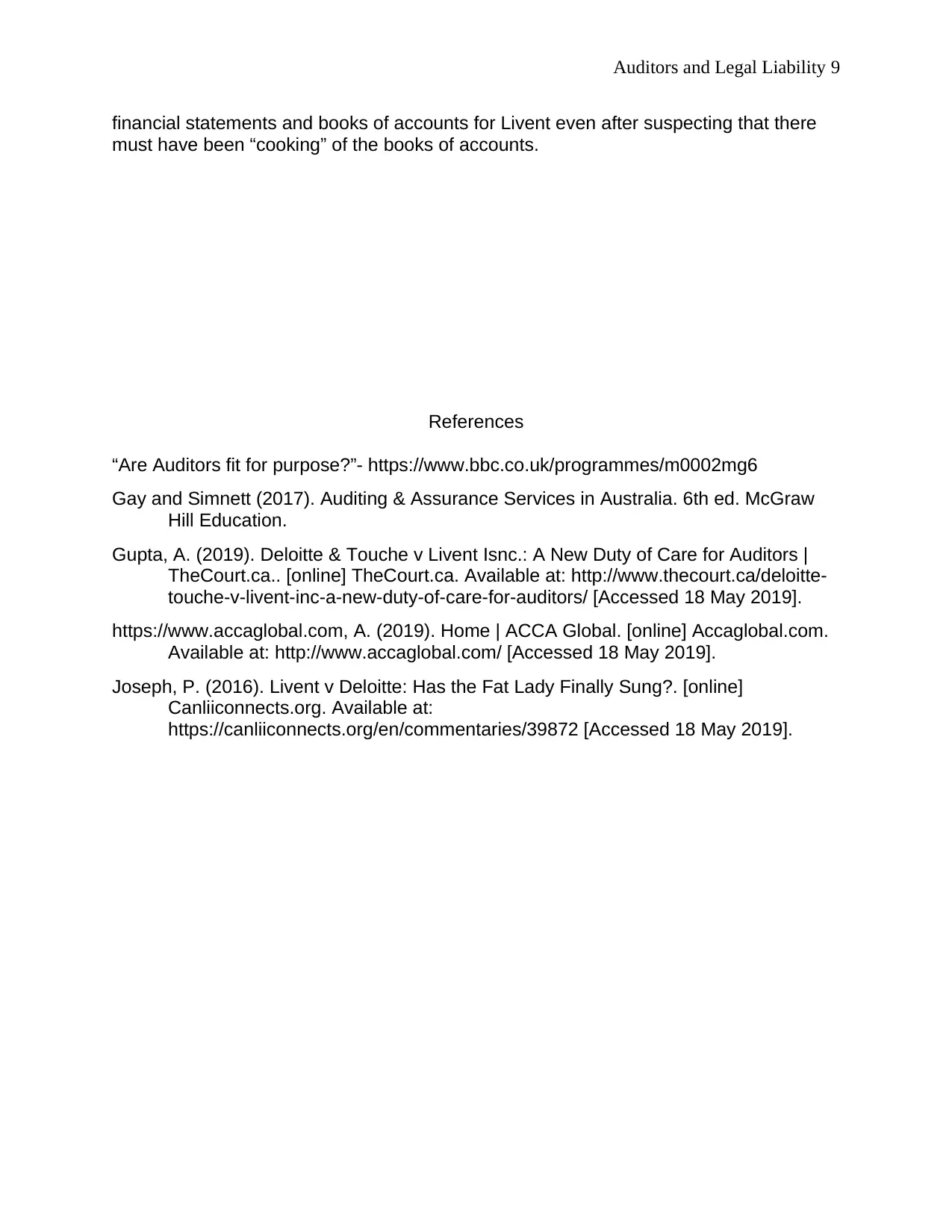
Auditors and Legal Liability 9
financial statements and books of accounts for Livent even after suspecting that there
must have been “cooking” of the books of accounts.
References
“Are Auditors fit for purpose?”- https://www.bbc.co.uk/programmes/m0002mg6
Gay and Simnett (2017). Auditing & Assurance Services in Australia. 6th ed. McGraw
Hill Education.
Gupta, A. (2019). Deloitte & Touche v Livent Isnc.: A New Duty of Care for Auditors |
TheCourt.ca.. [online] TheCourt.ca. Available at: http://www.thecourt.ca/deloitte-
touche-v-livent-inc-a-new-duty-of-care-for-auditors/ [Accessed 18 May 2019].
https://www.accaglobal.com, A. (2019). Home | ACCA Global. [online] Accaglobal.com.
Available at: http://www.accaglobal.com/ [Accessed 18 May 2019].
Joseph, P. (2016). Livent v Deloitte: Has the Fat Lady Finally Sung?. [online]
Canliiconnects.org. Available at:
https://canliiconnects.org/en/commentaries/39872 [Accessed 18 May 2019].
financial statements and books of accounts for Livent even after suspecting that there
must have been “cooking” of the books of accounts.
References
“Are Auditors fit for purpose?”- https://www.bbc.co.uk/programmes/m0002mg6
Gay and Simnett (2017). Auditing & Assurance Services in Australia. 6th ed. McGraw
Hill Education.
Gupta, A. (2019). Deloitte & Touche v Livent Isnc.: A New Duty of Care for Auditors |
TheCourt.ca.. [online] TheCourt.ca. Available at: http://www.thecourt.ca/deloitte-
touche-v-livent-inc-a-new-duty-of-care-for-auditors/ [Accessed 18 May 2019].
https://www.accaglobal.com, A. (2019). Home | ACCA Global. [online] Accaglobal.com.
Available at: http://www.accaglobal.com/ [Accessed 18 May 2019].
Joseph, P. (2016). Livent v Deloitte: Has the Fat Lady Finally Sung?. [online]
Canliiconnects.org. Available at:
https://canliiconnects.org/en/commentaries/39872 [Accessed 18 May 2019].
⊘ This is a preview!⊘
Do you want full access?
Subscribe today to unlock all pages.

Trusted by 1+ million students worldwide
1 out of 9
Your All-in-One AI-Powered Toolkit for Academic Success.
+13062052269
info@desklib.com
Available 24*7 on WhatsApp / Email
![[object Object]](/_next/static/media/star-bottom.7253800d.svg)
Unlock your academic potential
Copyright © 2020–2026 A2Z Services. All Rights Reserved. Developed and managed by ZUCOL.